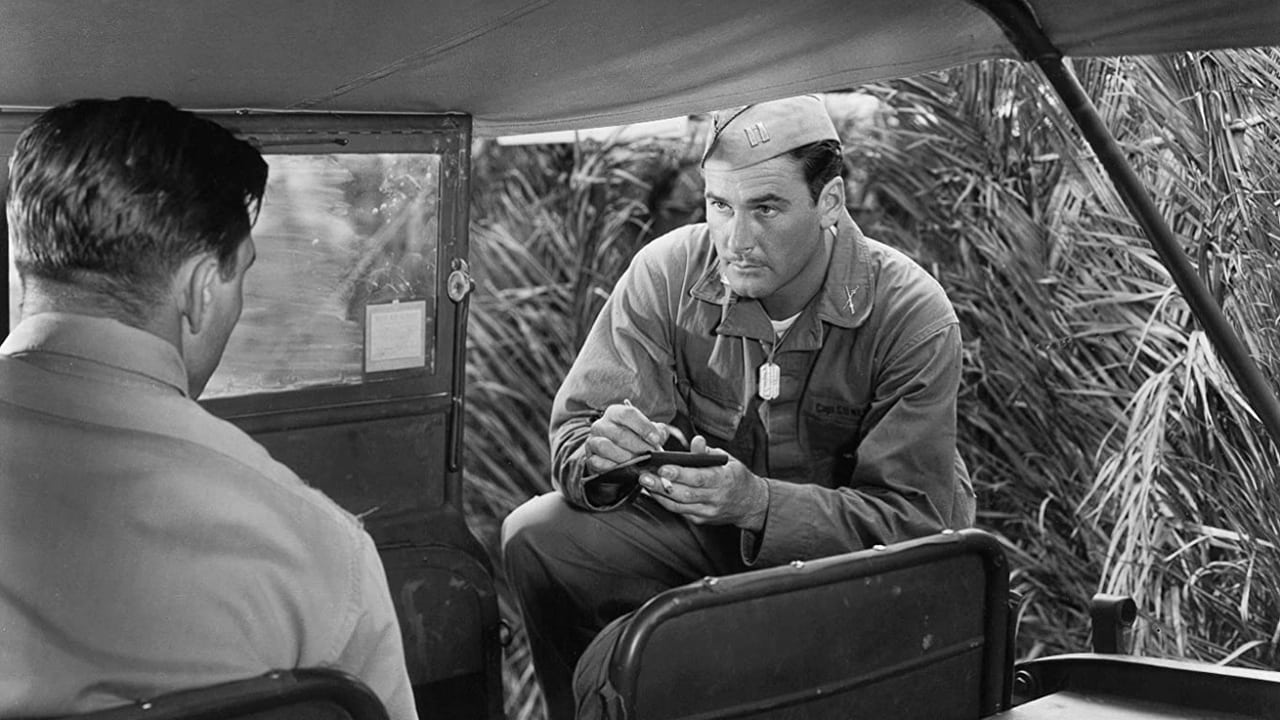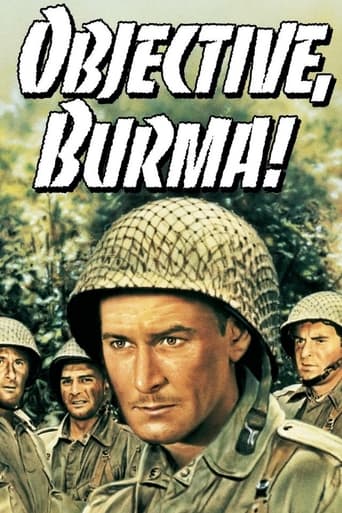

Good WW2 drama.Covers one of the less glamorous and more treacherous sectors of the war - Burma. The jungle conditions, complete with diseases and isolation, make for a gritty, uncompromising battlefield.Against the backdrop of the actual Burma campaign (sometimes using footage of the real commanders, rather than actors), we have this story. Full of daring and endurance, guts and determination.Very authentically made. As it is filmed in 1945, the US soldiers have the genuine equipment they would have been using during the campaign, from C-47s and P-38s to Tommy guns and M1 carbines.In order to capture the dash and dare of the mission, who else for the lead role but Errol Flynn. This did create one issue for me in that his Australian accent is obvious, and he is playing an American officer. I guess we could explain that away through thinking that maybe he is an Australian who emigrated to the US.On the downside, this movie was made during WW2, so does have big dollops of jingoism, nationalism and pure gung ho-ness in it. Thankfully, more limited in this regard than many WW2 era movies.
... View MoreAs a drama the film does a good job, in terms of historical accuracy one questions it. The fighting in Burma was not carried out by the USA, but by the army of the United Kingdom. Had this operation actually occurred, it would have been carried out by the SAS. English soldiers fought in Burma from day one until the very end of the war. Fighting in the harsh, humid jungles of Burma was no easy task for the English army who were not accustomed to the extreme climate, the Japanese soldiers had the advantage. By suggesting that the USA came in and saved the day, I.e., the Calvary rushing in at the last minute, we minimise the role of her Majesty's forces and those who fell in her service. Many Englishmen paid the ultimate sacrifice for their queen and country. Burma was a British sphere of operation, just as the Philippines were an American theatre of operations. Let's not minimise the role of others.
... View MoreErrol Flynn leads his men in "Objective, Burma!" a 1945 war film also starring James Brown, William Prince, George Tobias, and Henry Hull. Flynn, as Captain Nelson, is charged with parachuting his regimen to Burma and disabling a camouflaged Japanese Army radar station that is detecting Allied aircraft flying into China. An older war correspondent (Henry Hull) accompanies them. Unfortunately, once they were in Burma, getting out became much more difficult.There's something about Errol Flynn war movies that invites controversy, and this one is no exception. The film was withdrawn from release in the United Kingdom after one week because it infuriated British Prime Minister Winston Churchill and drew protests about the Americanization of an almost entirely British, Indian and Commonwealth conflict.That aside, it's actually quite a good movie with a very authentic feel, even though it was filmed in Hollywood. Actual weapons, uniforms, and gear came from the military, which added to the reality of the atmosphere.Errol Flynn does a terrific job as Nelson, a man who is an excellent soldier and leader but who also inspires loyalty among his men. One of the actors seemed very familiar to me, and he turned out to be James Brown, who starred in The Adventures of Rin Tin Tin when I was growing up.There's both triumph and tragedy in this absorbing film. Another reminder on Memorial Day of what servicemen suffered. Except in this case, they were from other countries besides the U.S. in reality.
... View MoreWar films made during World War Two changed distinctly as the conflict wore on. At the beginning there were idealistic flag-wavers, feature-length recruitment ads. Then there were pictures about endurance and perseverance, designed to keep everyone's spirits up. In the final year of the war, when victory was certain yet the full cost and horror of it all was known and keenly felt, war movies began to take on a dark and bitter edge. Among the darkest and bitterest of them all was Objective Burma, released just a few months before the defeat of Japan.The story of Objective Burma, which gave writer Alvah Bessie his only Oscar nomination, involves a mission deep in the jungle which goes entirely according to plan, all except for the pickup of the men to get them back to base. The situation you then have is a group of soldiers stranded in a jungle swarming with hostile Japanese. What results is an incredibly tense story in which the hope is not one of victory but simply one of survival. It really makes a great basis for an action movie, because like a good horror flick it elicits a kind of thrill through the continual sense of danger. The characters are fairly one-dimensional GI stereotypes – cheeky, earthy, working class guys – that you can see in any cheap war flick, but this in a way adds to the horrific and harrowing impact of many of the later scenes. It soon becomes pretty clear that the "Burmese dancing girls" that one of the men jokingly refers to in an early scene, are not going to make an appearance in this kind of war film.Of course, it can only work if we the audience feel immersed in that danger. This is where director Raoul Walsh comes in. Walsh was really adept at this sort of thing, and strives to constantly give us a feel of the soldiers' plight. His every shot seems composed to give us a sense of both the vastness and the oppressive closeness of the environment. Often he uses point-of-view shots, for example putting us in the position of a GI peeping out of the bushes at a passing Jap patrol. At other times he takes a god-shot, looking down on the pitiful band wending its way through the undergrowth. There's a great use of sound design, with various animal noises making eerie laughing and screeching noises. What is important too is Walsh's focus on faces. In a movie where, from a distance, every uniformed man looks alike, an occasional attention grabbing shot of some very individual expression helps to underline the sense of this as a human tragedy. As the situation becomes more and more desperate, Walsh literally darkens the screen, with the impressive James Wong Howe cinematography getting ever more shadowy.You couldn't have made Objective Burma at the height of the war. It's simply too bleak. It would be useless as recruitment propaganda. The one thing that really ties it to its era however is the vehemence it shows towards the Japanese. You really get that feeling of bitterness towards the foe in a protracted conflict, and even the kind of mindset that would start dropping nukes on cities. And then again, Operation Burma has a kind of timeless and placeless quality to it, being as it is so far removed from any kind of civilization or familiar reference point. Stripped down to a handful of men, a huge expanse of jungle and an ever-present but barely-glimpsed enemy, this is a suspenseful and exciting adventure with broad and lasting appeal.
... View More